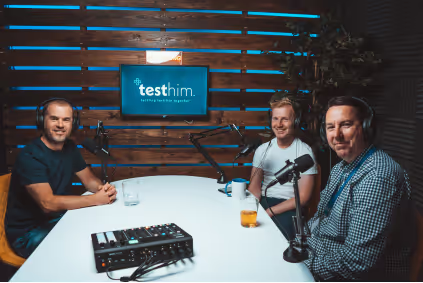We all know that a good night’s sleep is important, and we know how rotten we feel if it doesn’t happen.
Sleep plays a vital role in our body working in a healthy and balanced way whether that be regulating our mood, brain function, appetite, hormone function and so much more; it really is an essential part of us remaining healthy. In fact, there isn’t a part of our body that isn’t affected by the quality of our sleep. So, does that include sperm health? It certainly does!
How does lack of sleep affect sperm?
With sleep being so crucial to our day-to-day functioning and playing such a vital role in all aspects of our health, it’s pretty hard to pin down 1 key element as to why sperm are affected by lack of sleep.
However, having reviewed the study by Domínguez‐Salazar et al. (Chronic sleep loss disrupts blood–testis and blood–epididymis barriers and reduces male fertility. J Sleep Res. 2020;29:e12907) which looked at the mechanisms behind sleep deprivation and sperm quality, we found some really fascinating information that helps us understand why sleep deprivation is so detrimental to sperm.
Previous research has shown that lack of sleep has an effect on the blood-brain barrier by increasing its permeability (i.e. that barrier becomes weaker and lets more unwanted “stuff” through to the brain).
The researchers hypothesised that as the blood-testis and blood-epididymis barriers share similar characteristics to the blood-brain barrier, they expected the same issue to occur in the testis and epididymis. Their research concluded that lack of sleep did in fact increase permeability of the blood-testis and blood-epididymis barriers, which negatively affected sperm in terms of their motility and viability. The researchers also noted a decrease in sexual activity in rats that were sleep-deprived for longer periods of time. If you read on, we explain that this is likely to be as a result of decreased testosterone levels associated with sleep deprivation.
Why does the blood-testis barrier matter?
Sperm production (spermatogenesis) is a finely balanced process and is strictly regulated and controlled by the Sertoli cells (also called the nursing cells for germ cells) within the testicles. An increase in the permeability of the blood-testis barrier allows toxins and other unwanted compounds to enter the testis which cause damage to the production of sperm. With spermatogenesis being such a crucial and delicate process, it doesn’t take much for the entire system to be thrown out of balance with lack of sleep a clear disruptor. Similarly, if the blood-epididymis barrier is compromised, this will lead to problems with the final maturation of the sperm in the epididymis, thus leaving them dysfunctional.
A further study by Rizk et al. (Attenuation of sleep deprivation dependent deterioration in male fertility parameters by vitamin C. Reprod Biol Endocrinol (2020) 18:2) looked at the effects of sleep deprivation on hormone levels, specifically cortisol (our stress hormone), testosterone and total antioxidant capacity. What they discovered was that sleep deprivation raised cortisol levels and reduced testosterone and antioxidant capacity.
Cortisol and its association with stress is something many of us know about. What’s important to understand is the effects cortisol has on the body. Cortisol increases blood sugar levels and enhances the brains use of glucose, whilst also suppressing our immune system and reproductive system.
In a previous article on hormones, we looked at the crucial role of testosterone in the production, maturation and development of sperm cells. Any reduction in testosterone will have a profound effect on sperm quality along with libido and other essential roles of this important hormone.
Finally of note from this piece of research was the reduction in total antioxidant capacity. Antioxidants play an important role in counteracting the negative effects of free radicals. We know that an imbalance between free radicals (oxidants) and antioxidants, with an excess of free radicals, is detrimental to sperm health. You can read further about oxidative stress here.
Sleeps impact on lifestyle choices
It’s also important to consider the wider implications of irregular or poor sleep on other areas of our health and wellbeing.
Poor sleep tends to lead to lower mood, disturbances in blood sugar levels, poor digestion, poor cognitive function and so much more. It’s at these times where we’re more likely to reach for those caffeinated drinks, sugary snacks, take less exercise and generally make other less healthy choices. Coupled with the physiological effects already mentioned above, poor lifestyle choices will only compound an already poor situation adding to further damage to your sperm health.
And of course, shift workers are unfortunately far more likely to be negatively impacted by lack of sleep. Shift work has been well known to cause issues with a lot of what we’ve mentioned above as well as type-2 diabetes.
Positive steps to help you sleep better
What can you do if you don’t sleep well or if you’re a shift worker? Well not all is lost. There are things you can do to counteract the effects of poor sleep as well as making sure you have a healthy sleep routine to maximise good sleep.
Interestingly, the study by Rizk et al. mentioned above, was specifically looking at the effects vitamin C has on sperm health for sleep-deprived mice. They discovered that mice who were given vitamin C whilst in the sleep deprivation study had less oxidative stress, better testosterone levels and less damage to their sperm. This is believed to be as a result of vitamin C’s antioxidant qualities as well as its positive effect on reducing cortisol and increasing testosterone.
Of course, that’s not to say that vitamin C is perfect and the correct thing for everyone, however it does show that antioxidants play an important role in protecting sperm health. “Proxeed Men", “Proxeed Plus” or "M+" could be a good supplement to consider if you’re a shift worker or if you have confirmed oxidative stress.
With that in mind, it also highlights the importance of a good diet if sleep is hard to come by in your life. Reaching for high fat, high sugar foods as well as caffeine and fizzy drinks will only increase oxidative stress within the body. Ensuring you stick to a healthy, well balanced and antioxidant rich diet (natural antioxidants) will help counteract some of the negative effects of poor sleep.
Top tips for creating a good sleep routine
The ideal situation, of course, is that you sleep well and don’t have to try and counteract poor sleep, so what can you do to create a healthy sleep routine.
Here are some top tips:
- Try and keep to a regular routine of sleeping and waking at the same time (even at weekends)
- Ensure you get fresh air, exercise and daylight to help regulate your circadian rhythm, especially important first thing in the morning
- Consider a SAD lamp during winter months to help with a light boost in the mornings
- Avoid caffeine later in the day (coffee has a half-life of 8hrs!)
- Avoid using alcohol to try and help you sleep
- Try meditation, gentle yoga or breathing exercises before bed
- Avoid excessive blue light stimulation for 2 hours before bed (laptops, phones and tablets being the worst)
- Keep your bedroom on the slightly cooler side (approx. 19 degrees Celsius)
- Try and avoid snoozing in the morning, it just prolongs the groggy morning feeling
- Establish a good morning routine to get you into action and to help your body and mind wake up
- Avoiding sleeping during the day – although a short power nap (10 – 20mins) can be good for you
- Avoid tracking your sleep – it only induces more anxiety and stress about how much sleep you’re getting
- If you wake at night give yourself 15 mins to get back to sleep and if you’re struggling get up and do something like reading a book (not on a device) until you feel sleepy again
Poor sleep has become a major issue in our modern society. With constant stimulation from devices, blue light, artificial light and other stimulants we’ve lost our connection with nature and our natural rhythms. Nonetheless, taking some simple steps as listed above can have a really positive effect on your sleep and overall health.
If, however, you have concerns about your sleep and the impact it’s having on your health, you should visit your GP to get professional advice and support and to discount any other serious sleep disorders.















.png)


